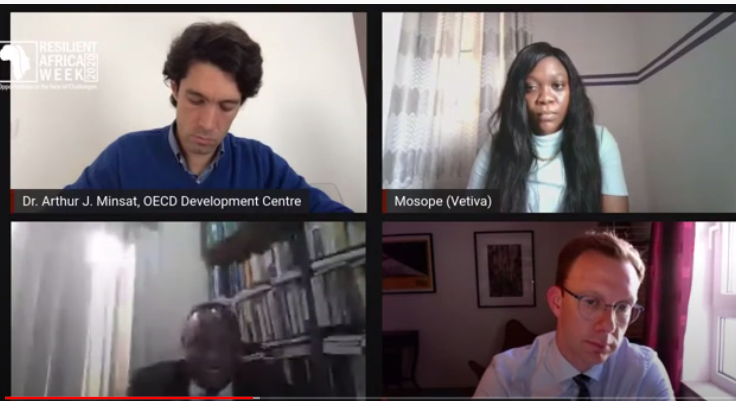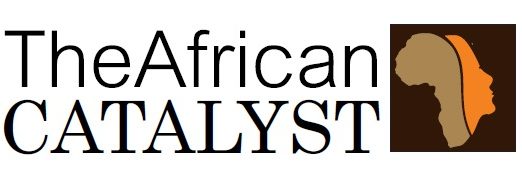Brickstone Africa sponsored Post Covid-19 Discussion Series; organized by the African Catalyst with the objective of bringing to light the various opportunities available post-covid-19 era currently not highlighted by the media.
African Economies: The panellists were Dr Arthur J. Minsat, Senior Economist and Head of Unit (Africa, Europe & Middle-East); Professor Jonathan Aremu, ECOWAS Regional Expert on Trade and Investment; Dr Tim Heinemann, Africa and the Middle East Economist, KfW Research, KfW Group; and Mosope Arubayi, Chief Economist, Vetiva Capital Management Limited who moderated the session.
The Livestream was sponsored by Brickstone Africa
The sole purpose of this session was to highlight and discuss how the COVID19 crisis has affected Major Economies in Africa; and the opportunities for these African Economies to Leverage the Crisis and Spur a New Growth Model.
Since the outbreak of the COVID19 pandemic, various economic units, individuals, businesses, and governments at different levels have battled with the impacts of the pandemic.
However, Africa which highly trades with countries like China will no doubt be affected by the fall in the price of commodities. Taxes and external financial inflows will reduce. So far, African countries have responded to the crisis swiftly and have put the right policies in place.
In addition, a policy tracker on the OECD website reviewed the country's policy on covid19 and recession. The thee different policies identified were: Immediately, Midterm and Longterm.
"Immediately" focuses on the humanitarian aspect, ensuring that there is no further spread of the pandemic. There is a need to ease the trade distortions to allow private and public sector’s immediate response for quick relief. Also, the informal sector needs some attention because, in most African countries, about 86% of the labour force are from the informal sector, with 10% having access to social protection mechanisms.
More so, there is a need to ensure that the government does not forget the people who are not registered, and who do not have bank accounts but can benefit from cash transfers, etc. Generally, Africa has to be prepared because there are current speculations of another wave of the virus. However, even though the virus did not severely hit Africa, the shock on the global economic front is terrible.
For the second step, is to have the macroeconomic leeway through policies that can improve the spending of countries. If we take the t situation of Nigeria, for instance, used the oil prices at about $60 per barrel in forecasting spending but then it hit $20 per barrel and almost 90 per cent of the government revenues come from the export of oil. Therefore, the situation is very different today than it was in the month of January.
This needs to be done together with Economic communities such as ECOWAS, and this has strong implications for the future because there have been strong discussions about the Economy as a common currency for West Africa for instance.
The third step policy adaptation is about the broad range objectives with regards to productive transformation, industrialization, creating new jobs-better jobs in the manufacturing sector, in services through digitalization and also new activities like tourism that can help create better jobs that are less vulnerable to shocks. Countries should also look at international partnership through foreign direct investment with the different tools that we have to finance development.

Foreign direct investment is significant here, and there have been changes in the way that it has been advocated in the continent. In the past, there was more foreign direct investment into the extractive industry – which basically just swallowed resources away from the continent exporting them outside completely. In essence, African countries produce what they do not consume, and consume what they cannot produce resulting in this balance between the exports and the imports.
However, in recent times we see a shift in the demographic trends with the rising urban middle class towards investment. FDI going into markets seeking strategic investment in more efficiency, particularly in services. So, the investment has shifted from more than half in the extractives to more than 50% of investments going into services.
The Covid19 crisis could be an opportunity as we see that there are big debates in the OECD economies about restructuring investments from Asia into other countries because Africa has geographic proximity, linguistic proximity and cultural heritage that can really help to make it more competitive. Nevertheless, the competitiveness called for is not about making bigger policies than our neighbours but it's for African countries to work together and to be more attractive through the regional economic communities as a union and this is why the African Union is very important.
There’s a lot of work that needs to be done between the African countries; including Nigeria where there are lots of trade distortions and also where the trade with neighbouring countries can be halted. Although there are reasons, these are obvious issues for African countries to work on.
There's a lot of synergy happening on the continent which is very dynamic. However, regarding the Intra Africa trade, the local value chains are really insufficient. If we compare them with developing countries in South Asia where the regional value chains are not so well developed we have 85 per cent and 15 per cent for the African continent.
Watch Livestream Replay
HOW CAN AFRICA POSITION FOR GROWTH?
For African economies to leverage the Crisis to Spur a New Growth Model, the panellist jointly recommended the following:
- There is a need to invest in industries that can facilitate the production of finished goods and promote multilateral trade within Africa.
- Boosting Intra Africa Trade through the manufacturing sector which will, in turn, create jobs.
- Special Economic zones to strengthen the African economy and foster investment in Africa
- Agri-business, value addition should be one of Africa's key focus/priority. There’s ample land, conducive climate all year round, sufficient workforce & a big market.
- - Creating jobs in in the formal sector by using industrialization advantage and also developing the digital economy.
OTHER RECOMMENDATION AND SOLUTIONS
- Africa needs to prioritize and work on trade, local transformation, infrastructures, skills, and business environment.
- One major Key is for most natural resource enterprises in Africa to "Add Value" and not just export raw materials. For example, selling Chocolate instead of Cocoa, Peanut Butter and not Peanuts etc.
- Embrace digitalization as a key component in Africa’s advancement. All the informal sectors should be brought to use digital platforms..
QUESTION AND ANSWER SESSION
The webinar saw several questions pertaining to the healthcare PPP framework and healthcare projects during the project. Some of these have been answered below:
Q: Does the Private Sector in West Africa has the grit to drive growth?
A: It depends on what part of the private sector. The private formal sector is quite small in Africa. However, we see this thriving skim of startups; and SMEs and they seem promising to certainly play a big role in the transformation of African economies. We can't say to what extent the scale of transformation. This is because these are small companies; so we really need to get a policy in place where we can grow them; especially in a way that they can create jobs.
Q: Should Africa delay the economic integration plan like the AFCTA, till each African country is able to at least jumpstart the economy to a reasonable level?
A: Absolutely! Although Initially, operational activity was to begin in June 2020. However, this cannot happen because quite a lot of countries are still battling the coronavirus outbreak. We are looking at January 2021 for now. The Head of the African Union has addressed that. The process of economic integration is already slowing; it was slowing even before Covid19 hit the continent and prevented negotiations from going on. The ratification of the process slowed down since October 2019. However, the slowdown is more of an opportunity than a problem.

